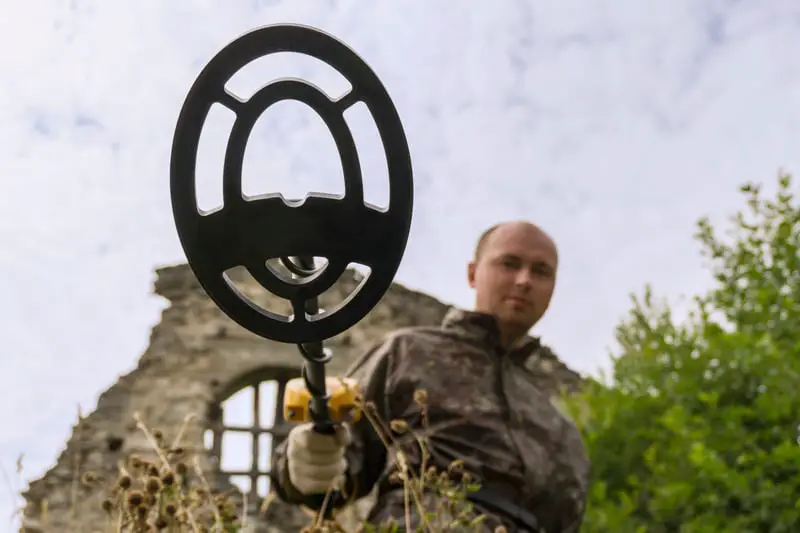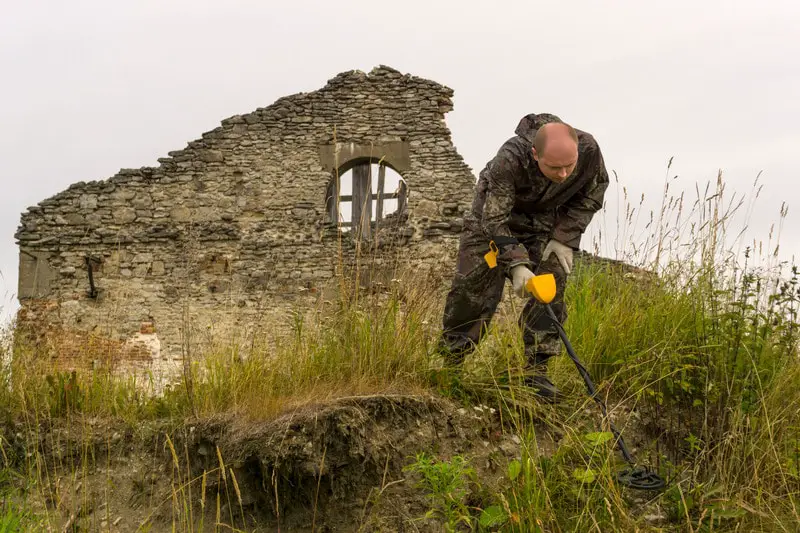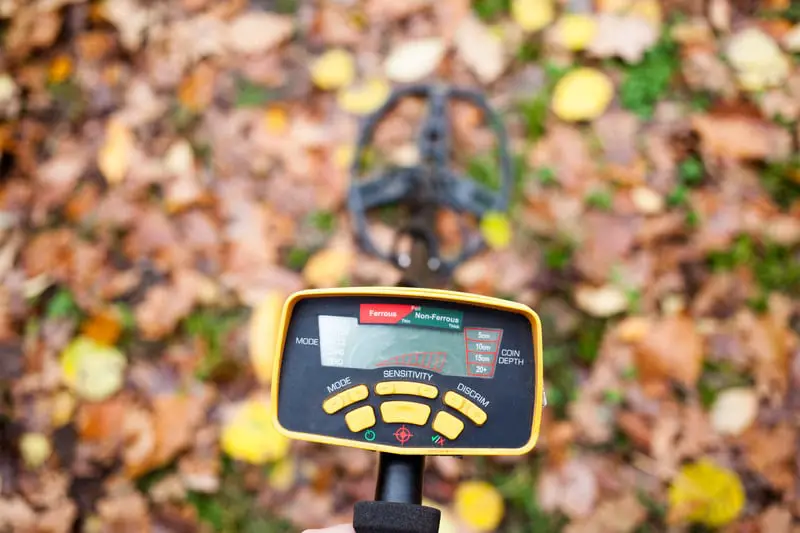For anyone who intends to use a metal detector today, you will be aware of just how many choices exist on the market. Metal detecting is a very diverse industry, with no shortage of metal detectors out there for you to choose from. If you find it hard to go ahead and make a choice, though, you might not be 100% sure how to do it correctly.
That’s why we recommend that if you do find it hard to make a choice that you read through this article today. We’re going to show you how to pick the right metal detector!
It’s about making the right choice
Especially if you are new to the concept of buying a metal detector, it can be tough to know where to start. If you make the wrong choice, you could be spending a lot of money on something that is not useful for you.
This could be down to anything from the metal detector not having the right frequency to simply not being suited to the kind of metal detecting that you intend to do. If you want to know how to go about picking the right metal detector, then this guide should be of use to you.
Factors to Consider When Choosing a Metal Detector

It’s all about choosing based on a few important factors and we’re going to break each of them down for you below. Hopefully, this will ensure that you can buy the metal detector you require.
It all begins with the budget
So, the first thing that you need to know is what kind of money you are intending to spend on said metal detector. If you are going to out and buy a metal detector, then you have to be ready to spend a few dollars. If you are going to take this properly seriously, then you don’t want to go and buy one of those cheap models that produces poor to minimal results.
What we recommend that you do is that you look to buy a metal detector based on the fact that you get what you pay for here. If you decide to go and buy a metal detector, then you will be getting something that is very much within the price that you are going to pay.
However, one good piece of advice that we can give you is that you shouldn’t just buy the most expensive model that you see. You need to look at the model and make sure that it fits the kind of metal detecting that you intend to do. You need to make sure you have something that allows you to enjoy the basics and so that you can see if you actually enjoy the hobby.
Don’t make the metal detecting equivalent of going out and buying a top-of-the-range Fender guitar before you even know how to play the chords. Money matters, yes, but you shouldn’t just buy the first highly expensive metal detector that you see!
What are you going to do with your detector?

Just as important as the above is making sure you buy a metal detector that is suited to what you intend to do. For example, going looking for old WWII memorabilia is different to going looking for scrap metal. The size of the product, the metal used, and the scale of submersion will all play a role in making sure you get a detector that matches your lifestyle.
You should look to try and buy an all-purpose metal detector if you are just getting started. These are generally quite good, and you can pick something like the NOX 600 or NOX 800. Both models offer a fantastic starting place for just about anyone to get started with. For the most part, though, you should definitely look to make sure you pick something based on the kind of metal detecting you want to do.
If you find that you live in an area with plenty of gold, then you should look to buy something a touch more robust. A metal detector like the AT Pro might make sense here. Basically, the best thing that we think you could do is that you could look into what is commonly found in your typical postcode.
This should go some way to let you know what kind of metal detector you might need. In terms of the type of metal detector that you buy, though, either go all-purpose or look for something much more particular.
Local Conditions Matter

A common mistake for a lot of people who intend to buy a metal detector is that they don’t look at their local area. seen as you are likely going to be spending most of your early time hanging around your local area, getting the right metal detector is very important. For example, have you spent much of any time looking at the condition of the ground all around you? If not, you really should spend some time looking into this.
For those who are going to be dealing with grass mostly, you can find that you should be looking to find shorter cut grass. Choosing a device with consistent ground balancing is highly recommended if you are going to be doing much of your looking around on the grass.
If you intend to go down the route of looking in rivers and creeks, though, you need to think about the right choice. You need to get something that is waterproof for a start, but these are often some of the best places to do some digging. Just make sure you have a solution that can actually handle the underwater aspect of the journey.
Always try and use an adapted metal detector if you are going to be spending any time at all on mineralized soil, though. This is going to make sure that you get more accurate readings, and this should help you to avoid wasting time digging and looking in a spot where your metal detector just detected something incorrectly.
Evaluating Your local Area
Before you do anything else, we would recommend that you take some time to look around your local area and work out what is actually available. Many of the times, you can find that having the time to simply look around can give you a good idea of what you might be finding.
If you are living in a large area with plenty of rivers and creeks, then you might wish to invest in a more waterproof model. If you tend to be working in an area that is going to be suited to finding coins, memorabilia, and jewelry, then you might have different needs to someone who is doing most of their work out in the desert or near rivers.
Basically, you should always look to read into the local metal detecting industry and see what (if anything) people are finding out there.
Need help?
Then you should definitely consider joining the local metal detecting club. You will find that if you do this, you should find it much easier for you to get some information on what you are going to find out. As a beginner, you might find that buying the right metal detector is simply too hard.
By speaking to locals who are hobbyists and deeply enthused by the experience, you will soon know what kind of treasure you could plunder from the local area. So, be sure to consider using social media and Google to find local clubs.
Key Factors In Choosing a Metal Detector
With so much to think about, we recommend that you take the following factors into account when buying a metal detector.
What kind of coil configuration does it use?
The configuration of the coils is a very important part of the process. You typically will find coils in a Double-D shape, a concentric style, or a mono loop. You should get used to looking at all three, as they will be more useful for certain types than others.
Double-D coils are good at getting through high depths for small targets, for example. Monoloop coils, though, are more advanced in their style and tend to be useful for those who are looking for items stored underneath mineralized soil.
Also, the size of the coils should come into your thinking. Coil size might not seem important, but the larger the coils the further depth it can take on.
Digging Deeper: How Search Coils Work
What kind of frequency can your metal detector operate at?
Next up for us would be the importance of finding the right frequency. Every metal detector has either a set singular frequency or a range of frequencies that it can cycle through. This is vital for making sure that you can get the right kind of finding, as what you might be looking for could be small, sensitive, and buried rather deep.
With a low frequency, you will find that you lack the ability to easily sense smaller targets. With a lower frequency, though, you can normally go much deeper into the ground than you could with a high-frequency model. High-frequency options, though, will allow you to find much smaller objects.
It’s basically about what you are looking for – shallow but small, or deep but hard to miss once you lay eyes upon the metal?
Digging Deeper: Metal Detector Frequency Explained
Ground balance – is it safe enough to use on your chosen surface?
Though not always something that would matter, ground balance is needed if you are detecting metal on a less than a flat surface. You need a good ground balance because you need to know that you are finding something suitable for your needs. Given that most soil will contain small traces of metal, you need a metal detector that can see beyond the metals found in the ground and the metals you are actually looking for.
Most of the time, you can get something with an Automatic or Manual ground balance. Most modern units have a self-detecting system installed, meaning that it will adjust for ground balance without any of the usual issues.
Preset models exist, too, which are able to reach a very particular level of balance that should work for the majority of your searching. For the most part, though, you should find that having something with solid ground balance is very important to your discoveries.
With that in mind, you should have no problem at all in enjoying using this particular metal detector. It’s something you need to consider if you want the easiest, most satisfying detection experience.
What kind of sensitivity does it provide?

Every good metal detector is going to have a kind of sensitivity setting. This is what allows it to react when it comes to across something that might be what you are looking for. Sensitivity is all about making sure you can easily spot smaller targets underneath the surface. The less sensitive a metal detector is, the more likely it’s going to be for finding smaller targets.
That’s a big reason why we recommend that you take the time to look at getting something with a high level of sensitivity. Unless you are only going out to find large pieces of metal, then you want something with a high enough sensitivity rating. That’s very important for making sure that it can give you the solution that you were hoping for.
So, what kind of sensitivity should you be looking for at this point? It depends, really.
Does your metal detector provide discrimination settings?
This is something that most if not all modern metal detectors will come with attached. These are very useful as they can help you to focus and home in on one particular finding. This means that if you are not looking for copper, you could make sure that your metal detector is discriminating copper from any of the looks and searches that you are carrying out.
For example, you might find that you have your fair share of aluminum to work with. If you don’t need that, then you can tell your metal detector to simply ignore any signs of aluminum. This gives you more time and space to stop and dig up things that you might not actually need. All in all, that can be very useful for making sure you are using a metal detector for a particular kind of search for specific metals.
What about the target ID?
Lastly, make sure that any metal detector that you look to buy into will come with a solid target ID. Target ID is very important though many people will not realize it. Target ID is useful for helping you tell not only if you have found a coin, but what coin you have found. For example, have you found a nickel or an old-school penny?
It can also tell you things like what you have found in terms of metal make-up. Is it made of silver? Gold? Or is it purely a bit of junk that you could easily enough leave in the ground?
Put simply, target ID will make sure that you spend less time messing around trying to find out what you have picked up. If you are on the lookout for something very particular, then this will ensure that you can do that without any real issues.
Target ID is often displayed via the LCD display screen, giving you a target ID number. As time goes on, you will know what ID number means and thus what it is that you have found deep within the ground itself.
Making the right choice

So, with so much to think about, you might not be 100% sure where to begin the next phase of your search. If you are unsure at all, then we recommend that you read over this again as soon as you can. It’s important to know what metal detector to look out for, and what one would suit your own personal lifestyle and metal detecting aims.
There are numerous factors that come into play when it comes to choosing what metal detector you would like to use. With that being the case, we recommend reading through this one more time. It might just give you all the help that you need to know exactly what is going to be coming next. With every metal detector that you buy, making sure that it can give you a good standard of consistency is very important.
You need to take the time to look through the various options, and this should give you the help that you need to make the right call. So, why not take a look at the information we have given you on metal detector selection again?
With everyone having their own aims, budget, and local area to search, you should find it much easier to make a choice you can be happy with moving forward. So, take a look at this and you can find that making the right choice is going to be much simpler. Best of luck!

I am looking for the BEST metal detector to find buried gold/silver treasure chest in sandy beach soil, probably at 3 to 6 feet depth.
Hi Richard, to find a treasure chest that deep I would recommend that you get the Minelab CTX 3030. The 3030 is a state of the art metal detector that can locate treasure in every soil type and it’s also waterproof. Check out my review here:
Minelab CTX 3030 Bundle [Complete Review]
The Minelab CTX 3030 has everything you need to locate a buried treasure chest. This is the exact metal detectors that they use on the show Curse of Oak Island. Hope this helps and good luck on finding that buried treasure chest! If you do locate it comeback here and let us know about it.
Cory